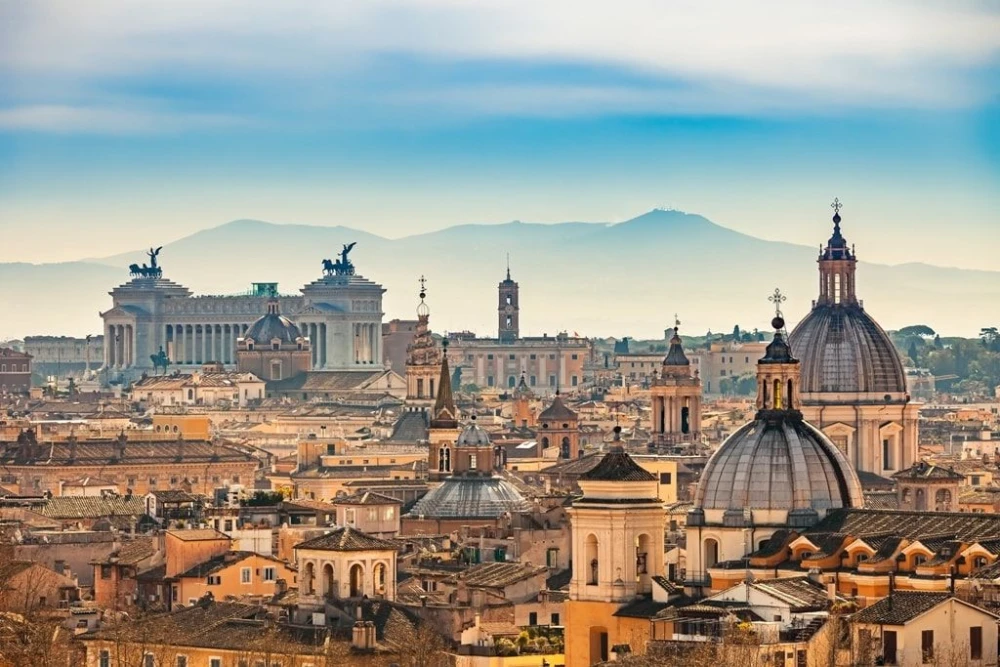15124, Maroysi, Athens, Greece
Civitavecchia (Rome), La Spezia, Cartagena-, Malaga, Gibraltar, Ponta Delgada, Cape liberty


Our gateway to the Eternal City, Civitavecchia has served as Rome's seaport since the 13th century, boasting a long and venerable history. Its location near the modern city, made it a perfect vacation resort for emperor Trajan, who built a pleasure villa. while Bernini and Michelangelo designed the harbor fortifications. Yet the Eternal City, the ancient capital of the Western World and the center of Christianity for nearly 2.000 years, is our main reason to be here. YYou can visit the ruins of the Forum and the Colosseum, throw a coin in Fontana di Trevi to make sure you return to Rome one day, take a photo in front of the Vatican, view the splendors of the Sistine Chapel or climb the Spanish Steps, once the heart of Rome's Bohemian Quarter and enjoy a delicious gelato, in the glamorous area.

La Spezia is a city of Liguria in northern Italy. Located at the top of the Gulf of La Spezia, it is an important commercial port and base of the Italian Navy. It is also the getway to Florence and Piza
Cartagena is major naval station located in south-eastern Spain, in the autonomus Region of Murcia. Since its foundation in 229 B.C, it has been inhabited by several cultures which have left their mark on its artistic heritage as one of the most important defensive ports in the country. The highlights of the city include the Muralla del Mar ('Sea Wall'), built by Charles III (18th century), the Old Cathedral located on the Camino del Parque Torres (behind the Muralla del Mar wall), the recently restored Roman Theatre (among its numerous other Roman remains, built between the 5th and 1st centuries BC), the National Museum of Underwater Archaeology ARQUA (at Paseo Alfonso XII, 22), the Town Hall, a gem of modernist architecture dating from the early 20th century and a number of modernist buildings made for its military fortifications. The best way to learn more about the Modernist architecture of Cartagena is to take a walk along the Calle Mayor, which leads off the Plaza del Ayuntamiento square. Here visitors will find the houses of Cervantes and Llagostera, by the Cartagena architect Victor Beltrí. Time given, don't miss Concepción Castle, built on one of the five hills of the old Carthagena and today home of the Centre for the Interpretation of Cartagena's History.
The southernmost large city in Europe, lies on the Costa del Sol (Coast of the Sun) of the Mediterranean, about 100 km east of the Strait of Gibraltar and about 130 km north of Africa. Málaga's history spans about 2.800 years, making it one of the oldest cities in the world. The walls of the Phoenician city are visible in the cellar of the Museo Picasso Málaga. The best-preserved Moorish citadel in Spain is located next to the Roman theater, which which dates from the 1st century BC and was rediscovered in 1951. The nearby caverns of Nerja provided refuge to humans 30,000 years ago and is a must-visit tourist attraction. Cruise guests can visit the old castles, the museums and the beaches or enjoy the scenery, sipping a Malaga sweet wine, accompanied with a plate of tapas.
Gibraltar is an amazing co-mingling of past, present and future.The Rock of Gibraltar was considerred by the Ancient Greeks as the pillars of Hercules, marking the end of the world. It is at the Top of the Rock where you begin to understand and appreciate Gibraltar’s strategic geographical location and the important role it has played throughout history. The journey to the top of the Rock rewards you with a truly breathtaking view. From a height of 426m you will see the African coastline, where the waters of the Atlantic meet the Mediterranean, Spain’s Costa del Sol and a panoramic view of the City far below, the quays, marinas and bays. Stand on top of the Rock of Gibraltar and you feel as if you were on top of the world.
Ponta Delgada is the largest municipality and administrative capital of the Autonomous Region of the Azores in Portugal, lying around a natural bay on São Miguel Island, the largest and most populous in the archipelago. Identified by its three arches known as the Portas da Cidade, it stands out for the large number of churches and other buildings, among which the baroque São Sebastião Church and the Todos os Santos Church. White-washed houses and buildings, 17th and 18th Century convents and churches decorate its rolling hills. Cobbled streets and small squares are found around the centre, where there is also a large boulevard, which is perfect for evening seaside walks. Visit Museu Carlos Machado (Carlos Machado Museum), the beautiful Praça 5 de Outubro (5th of October Square) which is dominated by a marvellous Renaissance Fortress, the Fortaleza de São Brás, the most romantic garden and most lush area in the city, Jardim António Borges (António Borges Gardens) or tour to the natural wonders of the island, such as the Lagoa das Sete Cidades (Seven Cities Lake), which is formed by two large lakes that fill the massive crater of a dormant volcano. From the Pico do Carvão one can enjoy fabulous panoramic views over the Lagoa das Sete Cidades.
Itinerary







